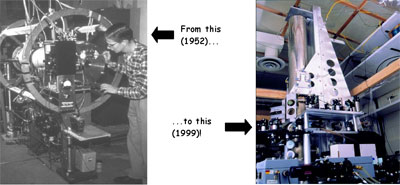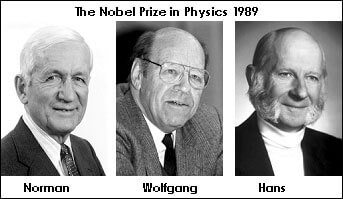Atomic Time - History
Nobel Prize and Atomic Time
Thanks to the development of atomic clocks, the measurement of time has never been so accurate. Atomic time has become a vital function of the 21st century. The ability to measure time precisely is important for a number of operations: Telecommunications rely on precise time for quality of service; time synchronization is critical to secure IT systems; the accuracy and stability of atomic clocks are key in aerospace and defense.
Although atomic time is employed heavily in the 21st century, it was throughout the 20th century that it was first developed. During the 1930's, Isidor Rabi, a physics professor at Columbia University, invented a technique called "magnetic resonance". This technique was used to measure the natural resonant frequencies of atoms. In 1945, he suggested that this technique could be used to make a clock. One of Rabi's students, Norman Ramsey, took this idea further. In 1949, Ramsey was able to create a much more accurate clock by making the atoms pass twice though an oscillating electromagnetic field. Using Rabi's technique, the world's first atomic clock was created. It used the ammonia molecule as the source of vibrations.

In 1955, Dr Louis Essen and J.V.L Parry developed a long beam apparatus. It used the cesium-133 atom to create a working clock. This was the first accurate cesium atomic and it was developed in the UK's National Physical Laboratory. Essen and his team teamed up with the U.S Naval Observatory. Together they were able to measure the frequency of the cesium transition in relation to time measured against the movements of planets. These works lead them to determine that a second is defined as 9,192,631,770 periods of the cesium-133 atom.
Whilst this work was going on, Jack Zacharias from the Massachusetts Institute of Technology worked on a product called "Atomichron", which was completed in 1956. "Atomichron" is considered to be the world's first commercial atomic clock. By 1960, 50 of these clocks had been sold for approximately $20,000 each.
The influence of atomic time really made its mark in 1967. At the 13th General Conference on Weights and Measures, a second was redefined based on the vibrations of the cesium atom. For the first time, the world's timekeeping system did not have an astrological basis.
Further recognition was awarded in 1989 when the Nobel Prize in Physics was awarded to three researchers - Norman Ramsey, Wolfgang Paul and Hans Dehmelt for their work on the development of the atomic clock.

Over the past 30 years, the accuracy of the atomic clock has been improving greatly. In 1975, the atomic clock measured time so that it would neither gain nor lose 1 second in 300,000 years. Two decades later, the clock was 20 times more accurate than this. The atomic clock is now so precise that it has an accuracy better than 1 second in 20 million years. The progression of atomic time allows other technologies to develop and improve. As atomic time continues to evolve, it will lead us forward into the future.
About the Author
Claire Gamble is a technical author and works on the development of time server solutions that synchronize time on computers and computer networks. For more information about NTP servers please visit the Galsys homepage.
This article may not be republished or reprinted in its complete form or in part without seeking permission and providing a relevant link to this site. It is a violation of copyright law to reprint or publish this content without following these terms.
Copyright © 2008 - 2025